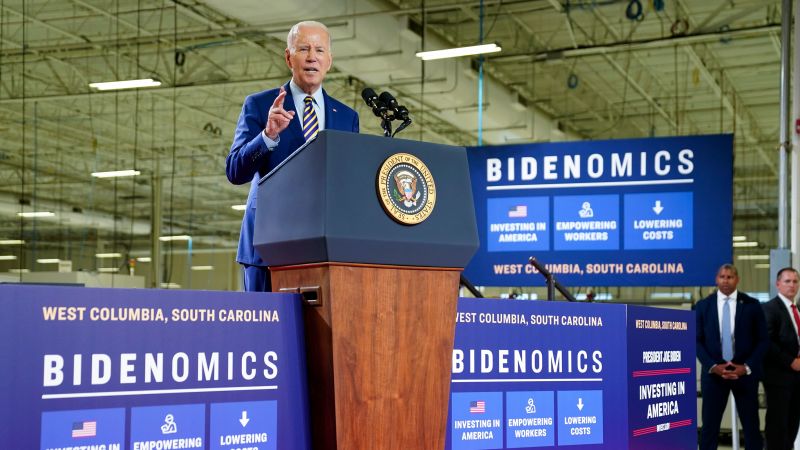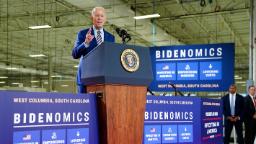

London
CNN
—
President Joe Biden embarks on a weeklong trip to Europe on Sunday, and the stakes couldn’t be higher for the future of the NATO alliance.
Biden makes a stop in London ahead of his attendance at the NATO Summit in Vilnius, Lithuania, followed by meetings with Nordic leaders in Helsinki, Finland. The backdrop, of course, is Russia’s ongoing war in Ukraine and last month’s failed coup attempt in Russia, posing the biggest threat to global stability for the alliance in recent history.
Biden will be a key player on a host of critical issues for the alliance as they gather in Vilnius, a city on NATO’s eastern frontier that sits approximately 20 miles from the Belarusian border. The summit will present a key test for the alliance’s continued remarkable level of unity after Russia’s invasion of Ukraine – and its credibility.
There will be questions about a pathway for Ukraine to joining NATO, and whether members are able to agree on Sweden’s bid for accession. Also at issue is the next steps for the war a month into Ukraine’s counteroffensive, questions about a potential endgame, and what long-term security assistance the leaders can offer to Ukraine.
Ukraine’s path to NATO membership is taking on increasing urgency and is likely to be one of the biggest flash points for the group as the war drags on – especially in the aftermath of Wagner chief Yevgeny Prigozhin’s abortive mutiny, which exposed cracks in Russian President Vladimir Putin’s military leadership and posed a potentially existential threat to his regime.
NATO first welcomed Ukraine’s membership aspirations during a 2008 meeting in Bucharest, Romania, but little progress has been made and the timeline remains uncertain. And while the US has said Ukraine will not be joining NATO as a member coming out of this meeting, the Vilnius summit presents a critical opportunity to take tangible steps toward that end in an important show of unity.
“Ukraine and many NATO allies are calling for a clearer pathway, a roadmap, some kind of statement at Vilnius that will show Ukraine what it needs to do to get into the alliance. And I think that is very important to happen for the alliance to be credible. Given the stakes of the war, … given what the Ukrainians have endured, if we walk out of Vilnius without a firmer sense of what it will take to get Ukraine into the alliance, I worry about the alliance’s credibility,” said Chris Skaluba, director of the Transatlantic Security Initiative in the Atlantic Council’s Scowcroft Center for Strategy and Security.
But Biden will be a key player in determining what specific, measurable criteria or timelines, if any, are offered to Ukraine for NATO membership during this summit.
Biden and members of his administration have remained committed to the alliance’s current posture. However, NATO countries in Eastern Europe bordering Ukraine or Russia have made a stronger push for a commitment to extend membership to Ukraine, including providing a more concrete timetable, which has created tension within the alliance leading up to the sunnit. And an early June letter calling for a clearer path to be laid out at the summit was signed by the Foreign Affairs Committee chairs from 22 nations, including US House Foreign Affairs Chairman Rep. Michael McCaul.
National security adviser Jake Sullivan told reporters that Vilnius “will be an important moment on that pathway towards membership,” providing an opportunity for members “to discuss the reforms that are still necessary for Ukraine to come up to NATO standards.”
Ukrainian President Volodymyr Zelensky told CNN in an exclusive interview that giving Ukraine an invitation to NATO would be important motivation for Ukrainian soldiers.
“This signal is really very important and depends on Biden’s decision,” Zelensky told CNN earlier this month.
The divide has prompted urgent discussions ahead of the summit, and result of the conversations could determine whether Zelensky attends.
“If we are not acknowledged and given a signal in Vilnius, I believe there is no point for Ukraine to be at this summit,” Zelensky told the Wall Street Journal in June.
Observers will also be closely watching how the leaders interact with Turkish President Recep Tayyip Erdoğan as he continues to block Sweden’s bid to join the alliance. Finland and Sweden formally applied to be part of the security alliance in May 2022, propelled by Russia’s invasion of Ukraine, and Finland was admitted this April. But Turkey’s objections to Sweden’s efforts continue, which could prove a major embarrassment and source of weakness for the alliance.
Sweden’s NATO membership is “within reach,” NATO Secretary General Jens Stoltenberg said in a news briefing following a meeting of senior officials from Turkey, Sweden and Finland Thursday. Stoltenberg expressed optimism for a “positive decision” and said he would meet with the Turkish and Swedish leaders in Vilnius next Monday.
In a notable show of support from the US, Biden welcomed his Swedish counterpart, Prime Minister Ulf Kristersson, to the White House Wednesday.
“The bottom line is simple: Sweden is going to make our alliance stronger and has the same value set that we have in NATO. And I’m really looking – anxiously looking forward for your membership,” Biden told Kristersson during a meeting in the Oval Office.
While Sweden’s leadership is playing a leading role in the negotiations, leaders will also be looking to Biden for what the US can offer to Turkey to grease the wheels. Turkey wants the US Congress to approve its purchase of US-made F-16 fighter jets. While US officials are reluctant to tie the Sweden issue and F-16s overtly, officials say that behind the scenes there is an obvious deal to be done.
The question of Sweden’s membership is not expected to be fully resolved during the summit – it will take a parliamentary procedure to formally approve – andleaders will be looking to Erdoğan for any signal that he is willing to remove the hold and eliminate any questions about the alliance’s solidarity.
“It would be a real failure for the alliance if it’s not able to get Sweden over the goal line here, and it’s a failure because it’s being held up by one member, Turkey,” said Max Bergmann, director of the Europe, Russia, and Eurasia Program and Stuart Center at the Center for Strategic and International Studies.
Bergmann continued, “If Sweden is not a member come the Vilnius summit … I think it really will lead to a confrontation with Turkey over whether Turkey, in fact, belongs in the alliance.”
As leaders gather, experts are watching for whether the alliance can offer any additional long-term security assistance to Ukraine, including the possibility of additional F-16 fighter jets and other long-term investments as a key signal to Russia of NATO’s long-term support for Ukraine.
In a major step during the G7 Summit in May, Biden informed G7 leaders that the US will support a joint effort with allies and partners to train Ukrainian pilots on fourth generation aircraft, including F-16s, a process that can take several months to complete.
“Right now, Ukraine is being supported in a very short-term way, that we are appropriating money and getting that money out the door as fast as possible to meet Ukraine’s defense needs for the current counter offensive,” said Bergmann.
However, he added, “It’s critically important to make a long-term financial commitment here to really send a message to the Russians that they are not going to win a long war and that our commitment to Ukraine will last,” noting the importance of such a commitment alongside the element of uncertainty surrounding the US 2024 presidential election.
The Indo-Pacific will also be a key topic for discussion among the leaders after they condemned the harms caused by China’s “non-transparent market distorting industrial practices,” in a communique wrapping the summit last year in Madrid.
Biden is also set to deliver what Sullivan described as a “significant address” in Vilnius “about his vision of a strong, confident America flanked by strong, confident allies and partners, taking on the significant challenges of our time, from Russia’s aggression in Ukraine to the climate crisis.”
Before the Vilnius summit kicks off, Biden will first visit the United Kingdom, where he will meet with King Charles III for their first one-on-one engagement since he ascended to the throne. In keeping with tradition, Biden did not travel to London for the coronation, but first lady Dr. Jill Biden and granddaughter Finnegan Biden attended the ceremony.
Biden has previously said he hopes to discuss environmental issues during his visit to Windsor Castle. It will be a closely watched moment for how the monarch balances his traditionally apolitical role with a cause he is passionate about.
Biden and the king, Sullivan said, will “engage with a forum that will focus on mobilizing climate finance, especially bringing private finance off the sidelines for clean energy deployment and adaptation in developing countries.”
And the president will also meet with Prime Minister Rishi Sunak, whom he hosted at the White House last month and with whom he has consulted closely on Ukraine and other foreign policy matters.
Biden will also offer a notable show of support to Nordic countries following the Vilnius summit, traveling to Helsinki, Finland, for a summit with the leaders of Finland, Sweden, Norway, Iceland and Denmark, marking the third such summit and the first of the Biden administration.
With Sweden’s NATO membership still in the balance, the tone of this meeting could be highly contingent on what, if any, progress can be made in Vilnius.
But there are other ripe areas for discussion, a Nordic official told CNN, including security cooperation, particularly in the Arctic, where there is a presence from both China and Russia. They are also expected to discuss areas of cooperation on technology, including 5G and artificial intelligence technology. And climate engagement and clean energy will also be key topics during the Helsinki visit.
